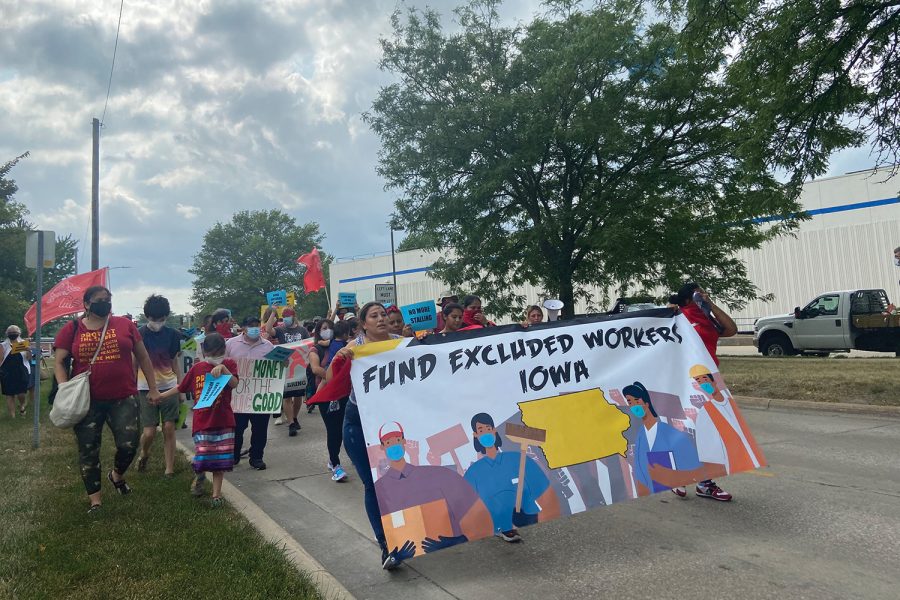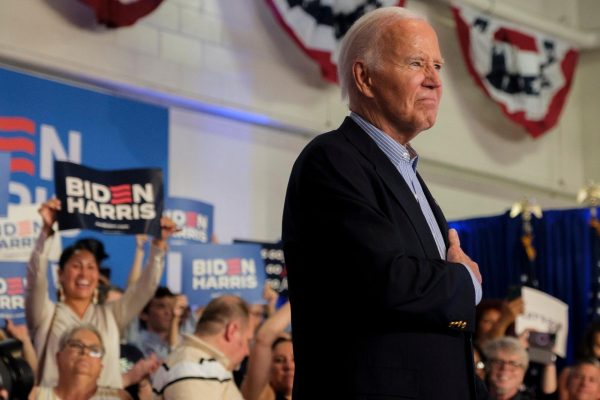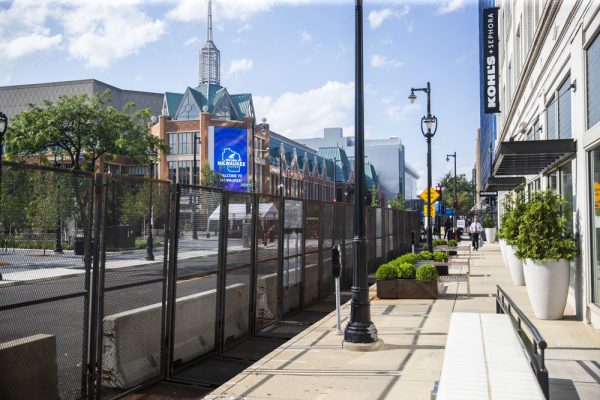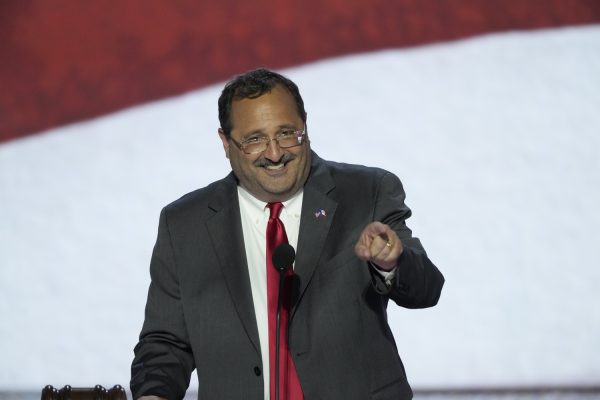Demonstrators call on city to provide funds for excluded workers
Over 100 demonstrators gathered at the Iowa City Catholic Worker House in support of allocating American Rescue Relief Plan Act funding to excluded workers Wednesday.
Demonstrators marched from the Iowa City Catholic Worker House to Mercer Park Wednesday afternoon.
August 11, 2021
Marchers gathered at the Iowa City Catholic Worker House in support of allocating American Rescue Plan funding to excluded workers Wednesday.
They held signs that said, “Public money for public good” and “El tiempo es ahora.”
The funding, granted on March 11 by President Joe Biden, will distribute $1.9 trillion in economic stimulus bills. The funds are to be organized and assigned for distribution by 2024 and spent by 2026.
Excluded workers are considered those not covered by federal or state pandemic assistance — undocumented immigrants, formerly incarcerated people, and others.
The U.S. Treasury granted $18.3 million to the City of Iowa City and more $29 million to Johnson County. Cedar Rapids decided how to allocate its American Rescue Plan funding in July.
Johnson County can use the funding to respond to economic and public health impacts of the pandemic through four categories but has not allocated the funds to specific or multiple areas at this time.
- Funding for assistance to small businesses, nonprofits, and households.
- Funding to aid impacted industries, such as tourism, travel, and hospitality.
- Funds for eligible essential workers during COVID-19 by giving premium pay.
- Funding for government services “to the extent of the reduction in revenue” because of COVID-19 related to revenues collected in previous years
- Funding for the county to make crucial investments in sewer and water systems or broadband infrastructure.
Iowa City City Manager Geoff Fruin told the marchers that the Iowa City City Council will discuss the funding at the Sept. 7 City Council meeting.
University of Iowa student Dulce Escorcia, 22, said they were marching in support of their family, who are immigrants. Escorcia said the gathering reminded them of all of the struggles their family went through when they were younger.
“Thankfully, luckily, we are okay, right now, but a lot of other people aren’t,” Escorcia said.
They said excluded workers were left behind by the federal government, but now have been overlooked by Iowa City’s government.
“This city has always been touted as a very liberal city and everything and a safe place for immigrants and all walks of life, but as one of those people, it doesn’t always feel like that,” Escorcia said. “I’m hoping that they’ll actually do what they claim to want to do and help people.”
As the group marched from the Iowa City Catholic Worker House to Mercer Park, a member of the Catholic Worker House Manny Galvez, 44, said the marchers chanted, “We are here and we will not leave; we are part of Iowa; the people together will not be defeated,” in Spanish.
Galvez, who has been a member of the Iowa City Catholic Worker House for 15 years, said he hopes the march will send a message to county officials that excluded workers need funding.
“We cannot live in a city with everybody saying ‘everybody’s welcome,’ when we forget thousands of workers,” Galvez said. “And again, it’s not just immigrants, it’s people – for whatever reason – that they don’t receive any kind of support.”
Eric Harris, a member of the Iowa City Truth and Reconciliation Commission, said the Iowa City government could easily make a choice to help excluded workers with economic assistance.
“You know, some of these guys are facing eviction, things like that right now. The city is just stalling and stalling and stalling,” Harris said.
Katie Biechler, a representative for Iowa Citizens for Community Improvement and Service Employees International Union Local 199, and member of the march’s planning committee, said the demonstration was planned after the bill was passed in March.
“We have thousands of workers in Johnson County who have been left out of other forms of relief. They were left out of stimulus checks over the last year and a half, they weren’t able to collect unemployment,” Biechler said. “It’s important that these folks get money directly into their hands, just like those of us who received stimulus checks because they also have rent to pay, mortgages, utilities, and have kids to feed.”















